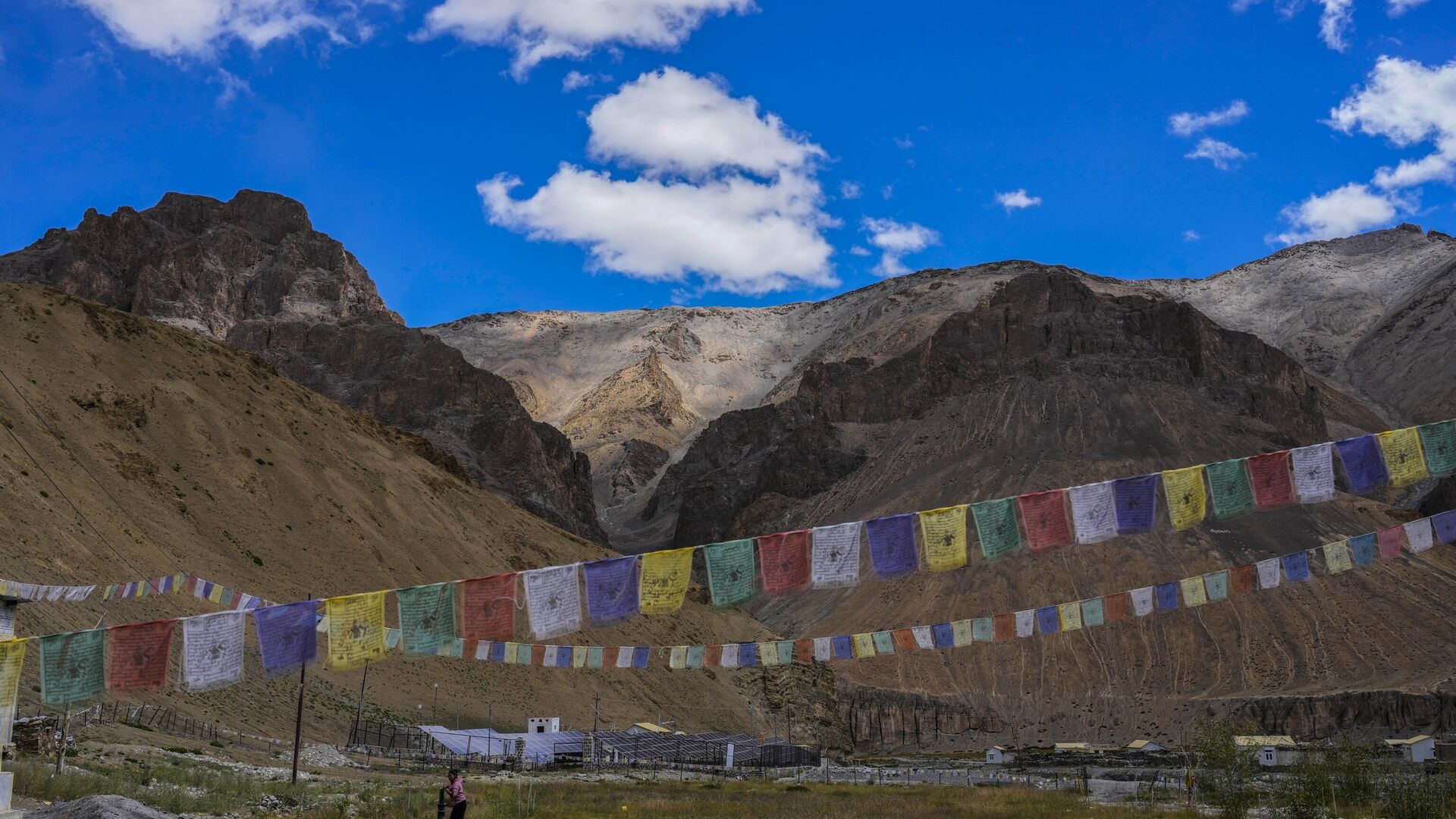https://sputniknews.in/20230619/ladakhi-groups-seeking-special-status-meet-home-minister-in-delhi-2554619.html
Ladakhi Groups Seeking Special Status Meet Federal Government in Delhi
Ladakhi Groups Seeking Special Status Meet Federal Government in Delhi
Sputnik India
Groups seeking special status for India's Ladakh region under the Sixth Schedule of the country's Constitution met senior officials of the Ministry of Home Affairs (MHA) in Delhi on Monday.
2023-06-19T20:23+0530
2023-06-19T20:23+0530
2023-06-19T21:14+0530
india
ladakh
jammu and kashmir (j&k)
bharatiya janata party (bjp)
new delhi
lok sabha
https://cdn1.img.sputniknews.in/img/07e6/0c/1e/316187_0:160:3073:1888_1920x0_80_0_0_8fba132a4b30aa817fdaeba18fdb7963.jpg
Groups seeking special status for India's Ladakh region under the Sixth Schedule of the country's Constitution met senior officials of the Ministry of Home Affairs (MHA) in Delhi on Monday.The Sixth Schedule guarantees exclusive rights over land ownership and government jobs for the native population.The talks were headed by Minister of State for Home Affairs Nityanand Rai who met with the Ladakhi residents representing multiple political and prominent socio-religious organizations.In the past, political parties, student groups, and socio-religious organizations have held multiple protests since the Indian government revoked the semi-autonomous status of the erstwhile Jammu and Kashmir state. The region was divided into two federally-administered union territories of Jammu and Kashmir, and Ladakh.The Indian government’s decision in August 2019 led to the formation of two alliances - the Leh Apex Body (LAB) and the Kargil Democratic Alliance (KDA) – which represent the demands of residents from Leh and Kargil divisions of the Ladakh region.Members from both alliances were part of the talks with the Indian government on Monday.Sajad Kargili, who represents KDA, told Sputnik that the group from Ladakh that traveled to New Delhi for the talks comprised six people representing all socio-religious, political, and student groups of the region.“We put forth all four of our demands including granting of statehood to Ladakh and application of Sixth Schedule. The representatives of the Home Ministry told us that there was a great need to start a dialogue process and they are all in to invest their time,” Kargili said.In January, the Indian government put together a high-powered committee to deal with the issues of the Ladakhi people. The government nominated members from both alliances to be part of the committee. However, the alliances seem to be unsatisfied with the composition and mandate of the committee.“We also raised our concerns over the composition of the committee. The Home Ministry told us that they are willing to hold discussions to take a relook over the composition of the committee,” Kargili said.“We have four demands which include statehood for the Ladakh region, exclusive rights over government jobs, that land ownership be limited to locals only and finally, the creation of two separate parliamentary constituencies. The government told us there is a need to have discussions on the demands and they are willing to do their bit,” Kargili said.Change in the Status of LadakhWhen Ladakh was part of J&K and enjoyed a semi-autonomous status, natives had exclusive rights over accessing government jobs and land ownership.The region could also elect four members for the state legislative assembly and one member for the lower house of the Indian parliament, the Lok Sabha.However, after the government revoked the special status of J&K and separated Ladakh, it was decided that the region would not have a local assembly.Instead, the government stated that it will make efforts to strengthen locally-elected representative councils also known as Hill Development Councils.
india
ladakh
jammu and kashmir (j&k)
new delhi
Sputnik India
feedback.hindi@sputniknews.com
+74956456601
MIA „Rossiya Segodnya“
2023
Azaan Javaid
https://cdn1.img.sputniknews.in/img/07e6/0c/08/19280_0:0:1080:1080_100x100_80_0_0_d0f3f10ac6f30fb5b9e5e21a5e2536ea.jpg
Azaan Javaid
https://cdn1.img.sputniknews.in/img/07e6/0c/08/19280_0:0:1080:1080_100x100_80_0_0_d0f3f10ac6f30fb5b9e5e21a5e2536ea.jpg
News
en_IN
Sputnik India
feedback.hindi@sputniknews.com
+74956456601
MIA „Rossiya Segodnya“
Sputnik India
feedback.hindi@sputniknews.com
+74956456601
MIA „Rossiya Segodnya“
Azaan Javaid
https://cdn1.img.sputniknews.in/img/07e6/0c/08/19280_0:0:1080:1080_100x100_80_0_0_d0f3f10ac6f30fb5b9e5e21a5e2536ea.jpg
ladakh region, jammu and kashmir, kashmir conflict, india pakistan ties
ladakh region, jammu and kashmir, kashmir conflict, india pakistan ties
Ladakhi Groups Seeking Special Status Meet Federal Government in Delhi
20:23 19.06.2023 (Updated: 21:14 19.06.2023) The talks are considered a breakthrough in Ladakh where political parties, student groups and socio-religious organizations have held multiple protests to demand statehood for the region with special status.
Groups seeking special status for
India's Ladakh region under the
Sixth Schedule of the country's Constitution met senior officials of the
Ministry of Home Affairs (MHA) in Delhi on Monday.
The Sixth Schedule guarantees exclusive rights over land ownership and government jobs for the native population.
The talks were headed by Minister of State for Home Affairs Nityanand Rai who met with the Ladakhi residents representing multiple political and prominent socio-religious organizations.
In the past, political parties, student groups, and socio-religious organizations have held multiple protests since the Indian government revoked the semi-autonomous status of the erstwhile Jammu and Kashmir state. The region was divided into two federally-administered union territories of Jammu and Kashmir, and Ladakh.
The Indian government’s
decision in August 2019 led to the formation of two alliances - the Leh Apex Body (LAB) and the Kargil Democratic Alliance (KDA) – which represent the demands of residents from Leh and Kargil divisions of the Ladakh region.
Members from both alliances were part of the talks with the Indian government on Monday.
Sajad Kargili, who represents KDA, told Sputnik that the group from Ladakh that traveled to New Delhi for the talks comprised six people representing all socio-religious, political, and student groups of the region.
“We put forth all four of our
demands including granting of statehood to Ladakh and application of Sixth Schedule. The representatives of the Home Ministry told us that there was a great need to start a dialogue process and they are all in to invest their time,” Kargili said.
In January, the Indian government put together a high-powered committee to deal with the issues of the Ladakhi people.
The government nominated members from both alliances to be part of the committee. However, the alliances seem to be unsatisfied with the composition and mandate of the committee.
“We also raised our concerns over the composition of the committee. The Home Ministry told us that they are willing to hold discussions to take a relook over the composition of the committee,” Kargili said.
“We have four demands which include statehood for the Ladakh region, exclusive rights over government jobs, that land ownership be limited to locals only and finally, the creation of two separate parliamentary constituencies. The government told us there is a need to have discussions on the demands and they are willing to do their bit,” Kargili said.
Change in the Status of Ladakh
When Ladakh was part of
J&K and enjoyed a semi-autonomous status, natives had exclusive rights over accessing government jobs and land ownership.
The region could also elect four members for the state legislative assembly and one member for the lower house of the Indian parliament, the Lok Sabha.
However, after the government revoked the special status of J&K and separated Ladakh, it was decided that the region would not have a local assembly.
Instead, the government stated that it will make efforts to strengthen locally-elected representative councils also known as Hill Development Councils.


